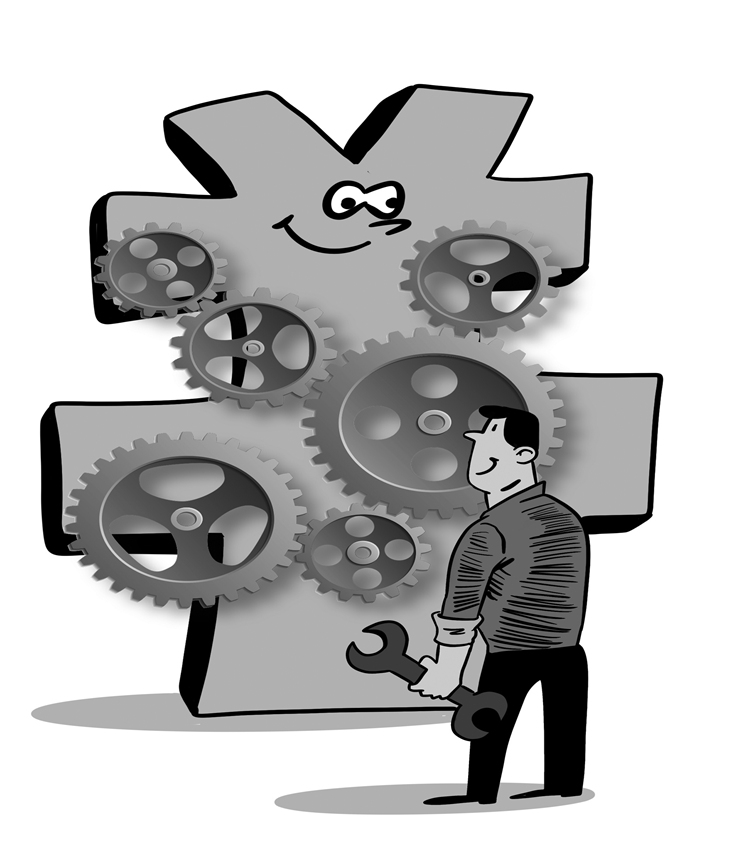HOME >> BUSINESS
Overdue lending rate drop could counter trade war impact, win back exports
By Zhou Qing Source:Global Times Published: 2019/11/21 20:33:41

Illustration: Luo Xuan/GT
China has taken a cautious step closer to the global trend of monetary easing and low interest rates as the benchmark lending rate dropped on Wednesday. The move is expected to ease pressure on Chinese economy from the China-US trade war, and to help China win back exports and build up a more attractive stock market.The one-year loan prime rate (LPR) released was 4.15 percent, five basis points lower than last month, and the five-year LPR was down five basis points to 4.8 percent.
After clearing a path for the monetary transmission mechanism with a slew of measures including interest rate reform, a one-year medium-term lending facility rate cut and a 7-day reverse repo rate cut, the drop in the LPR was a "natural" result and in line with market expectations.
The LPR has become more market-oriented and will become increasingly influential as more banks and financial institutions adopt it as a benchmark while granting loans.
Central banks around the world have employed every option to fire up their economies. Multiple central banks worldwide have lowered interest rates this year. The European Central Bank slashed its interest rate into negative territory and restored the stimulus in September.
In the US, the Federal Reserve (Fed) has cut the federal fund rate three times this year, now in the range of 1.5 percent to 1.75 percent despite the inflation rate remaining lower at around 2 percent. In an attempt to take monetary policy hostage, US President Donald Trump has compelled the Fed to cut its rate. The Fed's Chairman Jerome Powell expressed the possibility of taking a break from interest cuts after a Federal Open Market Committee meeting at the end of October. On Monday, Trump tweeted that he had a meeting with him recently, discussing "interest rates, negative interest, low inflation, easing [and] dollar strength."
The main reason Trump intended to manipulate the Fed and meddle with monetary policy, which cut close to provoking a currency war, was to continue stimulating US economy, forming a weaker US dollar and reducing the cost of US national debt. Eventually, more favorable readings of US economic indicators could help Trump collect more political credit for his re-election bid.
An article published in the Financial Times claimed that China had lost ground to the US during the first half of 2019 in terms of exports. Supposing the dollar index grows weaker as the Fed interest rate cut generates ripple effects, US products will likely become more competitive which could boost the country's domestic manufacturing industry.
The downward pressure on the Chinese and global economies is calling for looser monetary policy and lower interest rates.
The prolonged trade war between China and the US and a looming global economic recession have weighed on the Chinese economy.
GDP growth slowed to 6 percent in the third quarter of this year. China's US dollar-denominated exports fell 3.2 percent in September, year-on-year. The country may surrender its world's leading exporter position to the US if China does nothing and allows Trump to get what he wants.
A lowered LPR rate could bring down the value of the yuan and give an edge to Chinese production in the international market. Besides, an LPR drop would generate more liquidity in China's economy - a boon for the Chinese A shares. This may relieve the trade woes to some extent.
There has been debate about whether the liquidity released by an LPR drop could truly be directed to targeted businesses, specifically small and medium-sized enterprises. And Wednesday marks the first time that five-year LPR, which serves as a benchmark for real estate mortgages rates, has seen a decrease. Although it may be interpreted as a positive sign for the housing market, policymakers are unlikely to loosen regulations on housing speculation.
A more market-oriented LPR is designed to better support the real economy, which underpins economic fundamentals. But it will require wisdom and determination for policymakers to harness and navigate the various monetary tool kits.
One thing is certain: China has more leeway than the US in terms of interest rate adjustment. The overdue stimulus will boost the Chinese economy, revive its exports and motivate its stock market.
The author is a reporter with the Global Times. bizopinion@globaltimes.com.cn
Posted in: INSIDER'S EYE